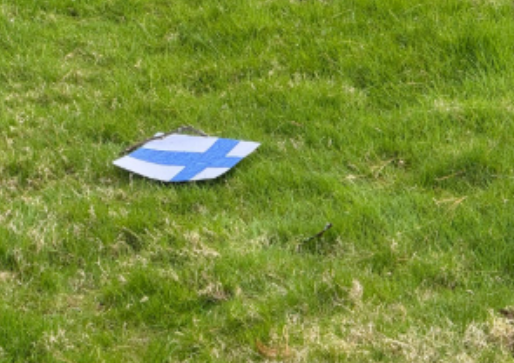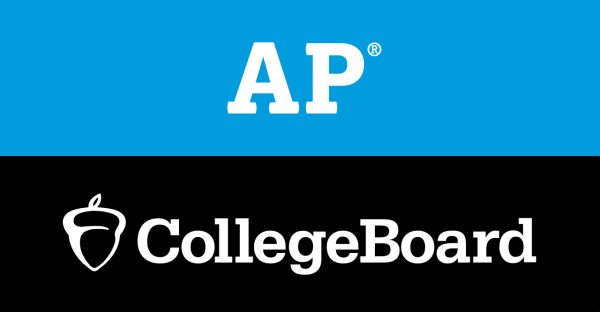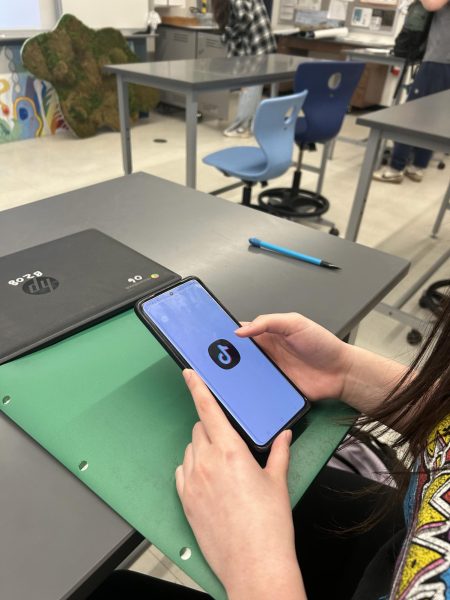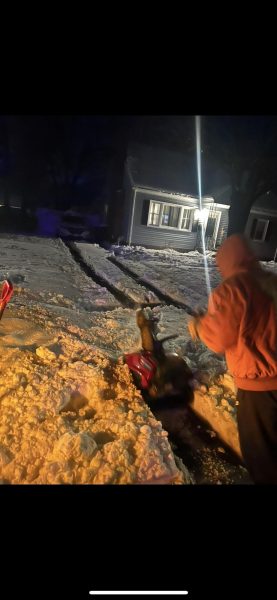Are Hall Students Wearing Masks and Socially Distancing Outside of School?
Research shows mixed results on how well Hall students are wearing masks and socially distancing outside of school, as student COVID-19 cases spike and the nation heads for “dark winter.”
A new survey of 245 randomly selected Hall students gauged how cautious of COVID-19 students are outside of school. When asked “Do you wear masks when you are with your friends outside of school?” the majority of students, 48.5 percent, reported that they do not consistently wear masks. Just over a third of students answered that they always wear masks, while 15.1 percent said that they don’t wear masks. Fortunately, all but one student reported “always” wearing a mask when entering a store.
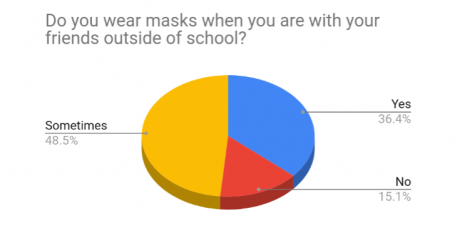
Likewise, the majority of students said that they “sometimes” social distance when they are with their friends, while 25.7 percent said they always social distance and 17.1 percent said they do not. Considering the exponential growth of COVID-19, the number of students not consistently wearing masks or socially distancing risks chances of returning to school fully in-person.
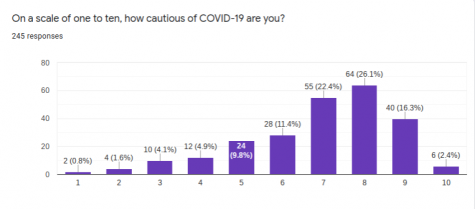
Despite all of this, students feel confident that they, personally, are doing a good job of preventing the spread of COVID-19. Students were asked to assign themselves a number, with one being the least cautious of COVID-19 and ten being the most cautious. The majority of students scored between six and nine, with 26.1 percent answering “eight.”
Nevertheless, the slight majority of students answered that their peers could be wearing masks and socially distancing more consistently. Some students used the open-ended space to express their frustrations with students’ handling of COVID-19. “I am furious when I see people from Hall on social media gathering like the pandemic has somehow ended,” an anonymous student commented. “I have a preexisting condition, and so does one of my immediate family members and many of my extended family members. I’m deathly scared for my family, but everyone at school seems to have the mindset that ‘If I get it, I’ll get it.[…]’ Many Hall students don’t understand the impact that their careless behavior has on families like mine. If I contracted COVID from a reckless kid at school and was responsible for my family members getting sick[,] I would be devastated and feel incredibly guilty.”
Although Hall is located in one of the safest regions in the United States, “positive case notifications” from Superintendent Tom Moore are popping up in parents’ inboxes daily. Given that students are mandated to wear masks at school, most infections are likely arising from outside of school interactions. 93.1 percent of the survey respondents agree.
The spread of COVID-19 is not just limited to the school district, though. On Friday, as the Connecticut infection toll reached 100,000, the state reported a positivity rate of 6.63 percent. The positivity rate has since dropped to 4.09 percent, but almost all towns remain under a “red alert,” which urges the highest level of caution.
Seeing the recent spike in cases, many nearby schools, including Northwest Catholic, have announced that, following Thanksgiving break, students will not immediately return to in-person learning. Hall, however, has not made such an announcement. The survey seems to back up this approach, as 69.4 percent of survey respondents said that they will only be having Thanksgiving with their immediate family – a positive (no pun intended) sign for the future.
Public health experts warn that the current spike could increase, though, as temperatures cool and Americans spend more time indoors, where the virus is more likely to spread. In addition, more and more Americans are experiencing “virus fatigue,” which epidemiologists say will worsen infection and death rates. This has President-elect Joe Biden telling Americans that “we are headed for a dark winter.”
Certainly, there has been some positive news regarding the pandemic. Pfizer and Moderna both recently reported their vaccines are over 90 percent effective. Front-line workers could be vaccinated as soon as mid-December, too. But, until the vast majority of Americans are vaccinated, masks and socially distancing will be the country’s biggest tool in fighting the pandemic. It seems that many Hall students are doing their part, though, most students acknowledge that there is room for improvement.

